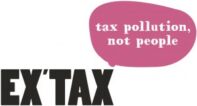Study by The Ex’tax Project: New era. New plan. Fiscal reforms for an inclusive, circular economy. Case study the Netherlands.
Click to access: New Era. New Plan. [Pdf]
The Ex’tax Project in cooperation with Deloitte, EY, KPMG Meijburg and PwC
Publication date: November 27, 2014
Pages: 166
Abstract
In the European Union, awareness has grown that a transition is needed to an inclusive and circular economy, providing full employment while making clever use of resources. EU tax systems currently play a key role in inhibiting such economy. Many labour-intensive business models are needed in a circular economy, including repair, urban mining, innovation and redesign of products and services. High labour taxes and social contributions, however, currently provide incentives to businesses to hire as few people as possible, or to outsource to low-income countries. Environmental taxes are considered more growth-friendly and less distortive than taxes on labour, but still, environmental taxes are at their lowest level in more than a decade.
The concept of a tax shift from labour to natural resource use and consumption has gained traction amongst international institutions and businesses, but also poses considerable challenges with regard to implementation. This report describes the rationale for a tax shift and the extensive literature on the topic. It includes a methodology to assess viable options for a tax shift (the Ex’tax Policy Toolkit) and a € 33.7 billion scenario for the Netherlands as the first case study.
This report stands out for exploring both sides of the budget-neutral tax shift; showing both policy options for increasing taxes on natural resources and consumption and specific policy options to lower labour costs. The impact of a tax shift on employment and businesses is also examined. If internationally coordinated, the study concludes, a tax shift could potentially create hundreds of thousands of jobs.
The study aims to contribute to the challenge of adapting our tax systems to 21st century needs, as targeted by Dutch and EU policies.
“This report describes clearly what steps can be taken to shift tax from labor to resources and thus stimulating the circular economy and a more conscious use of scarce materials whilst stimulating job creation. The depth and number of options in the report are impressive. It is time for serious consideration and taking next steps to drive this initiative further and create a more sustainable world”.
– Feike Sijbesma, CEO Royal DSM.
“A very thorough report that shows in detail the possiblities for a shift in taxation. It would be wise for the legislator to use these insights to enable both job creation and the transition to a circular economy.”
– Prof. Dr. Herman Wijffels, economist, former Dutch representative at the World Bank.
“To transform our society to a sustainable society we need to make our economies move in a different direction. Shifting the direction of our economy will only happen if we shift the economic incentives. Shifting the economic incentives, means shifting what we tax. This report shows us it can be done. Tax to save the world.”
– Peter Bakker, Chairman of the World Business Council for Sustainable Development (WBCSD)
